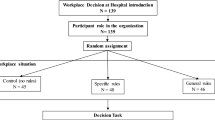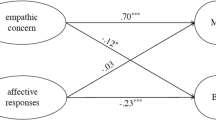Abstract
Scholars have shown renewed interest in the construct of courage. Recent studies have explored its theoretical underpinnings and measurement. Yet courage is generally discussed in its broad form to include physical, psychological, and moral features. To understand a more practical form of moral courage, research is needed to uncover how ethical challenges are effectively managed in organizational settings. We argue that professional moral courage (PMC) is a managerial competency. To describe it and derive items for scale development, we studied managers in the U.S. military and examined prior work on moral courage. Two methods were used to measure PMC producing a five dimensional scale that organized under a single second-order factor, which we termed overall PMC. The five dimensions are moral agency, multiple values, endurance of threats, going beyond compliance, and moral goals. Convergent and discriminant validity are analyzed by use of confirmatory factor analysis procedures. We conclude by presenting a framework for proactive organizational ethics, which reflects how to support PMC as a management practice.
Similar content being viewed by others
References
Abelson, R. P.: 1981, ‹Psychological Status of the Script Concept’, American Psychologist 36, 715–729.
Askanasy, N. M., C. A. Windsor and L. K. Treviño.: 2006, ‹Bad Apples in Bad Barrels Revisited: Cognitive Moral Development, Just World Beliefs, Rewards, and Ethical Decision-making’, Business Ethics Quarterly 16(4), 449–473.
Bagozzi, R.P.: 1993, ‹Assessing Construct Validity in Personality Research: Applications to Measures of Self-esteem’, Journal of Research in Personality 27, 49–87.
Bagozzi, R.P., Y. Yi and K. D. Nassen.: 1999, ‹Representation of Measurement Error in Marketing Variables: Review of Approaches and Extension to Three Facet Designs’, Journal of Econometrics 89, 393–421.
Bagozzi, R.P., Y. Yi and L. W. Phillips.: 1991, ‹Assessing Construct Validity in Organizational Research’, Administrative Science Quarterly 36, 421–458.
Boyatzis, R. E.: 1982, The Competent Manager: A Model for Effective Performance (John Wiley and Sons, New York).
Bright, D. S., K. Cameron and A. Caza.: 2004, ‹Exploring the Relationships between Organizational Virtuousness and Performance’, American Behavioral Scientist 46, 766–790.
Cameron, K., J. E. Dutton and R. E. Quinn.: 2003, Positive Organizational Scholarship: Foundations of a New Discipline (Berrett-Koehler, San Francisco, CA).
Cameron, K. S. and R. E. Quinn.: 2006, Diagnosing and Changing Organizational Culture: Based upon the Competing Values Framework (Jossey-Bass, San Francisco, CA).
Carlson, D. S., K. M. Kacmar and L. L. Wadsworth.: 2002, ‹The Impact of Moral Intensity Dimensions on Ethical Decision-making: Assessing the Relevance of Orientation’, Journal of Managerial Issues 14(1), 15–31.
Flanagan, J. C.: 1982, ‹The Critical Incident Technique’, Psychological Bulletin 4, 327–358.
Furnham, A. 2002, ‹Managers as Change Agents’, Journal of Change Management, 3(1), 21–29
Gallon, M. R, H. M. Stillman and D. Coates.: 1995, ‹Putting Core Competency Thinking into Practice’, Research Technology Management 38(3), 20–28.
Gates, J. B.: 2004, ‹The Ethics Commitment Process: Sustainability through Value-Based Ethics’, Business and Society Review 109(4), 493–516.
Gioia, D. A. and P. P. Poole.: 1984, ‹Scripts in Organizational Behavior’, Academy of Management Review 9, 449–459.
Goud, N. H.: 2005, ‹Courage: Its Nature and Development’, Journal of Humanistic Counseling, Education, and Development 44, 102–116.
Grant, C.L.: 2002, ‹Whistleblowers: Saints of Secular Culture’, Journal of Business Ethics 39(4), 391–400.
Greitemeyer, T., S. Oswald, P. Fischer and D. Frey.: 2007, ‹Civil Courage: Implicit Theories, Related Concepts, and Measurement’, The Journal of Positive Psychology 2(2), 115–119.
Handelsman, M. M., S. Knapp and M. C. Gottlieb.: 2002, ‹Positive Ethics’, in C. R. Snyder and S. J. Lopez (eds.), Handbook of Positive Psychology (Oxford University Press, New York), pp. 731–744.
Hannah, S. T., P. J. Sweeney and P. B. Lester.: 2007, ‹Toward a Courageous Mindset: The Subjective Act and Experience of courage’, The Journal of Positive Psychology 2(2), 129–135.
Harris, H.: 1999, ‹Courage as a Management Virtue’, Business and Professional Ethics Journal 18(3/4), 27–46.
Harris, H.: 2000, Courage as a Management Virtue. Paper Presented at the Association for Practical and Professional Ethics, 9th Annual Meeting, Arlington, VA.
Hesselbein, F.: 2005, ‹The Leaders We Need’, Leader to Leader 35, 4–6.
Higgins, J. M. D. M and Currie.: 2004, ‹It’s Time to Rebalance the Scorecard’, Business and Society Review 109(3), 297–310.
Jackall, R.: 1988, Moral Mazes: The World of Corporate Managers (Oxford University Press, New York).
James, W.: 1897, The Will to Believe and Other Essays in Popular Philosophy (Longmans Green, New York).
Jones, T.: 1991, ‹Ethical decision-making by Individuals in Organizations: An Issue-contingent Model’, Academy of Management Review 16(2), 366–395.
Jöreskog, K.G. and D. Sörbom.: 1999, LISREL8: User’s Reference Guide (Scientific Software International, Chicago, IL).
Kidder, R. M.: 2005, Moral Courage (HaperCollins, New York).
Marsh, H·W. and M. Bailey.: 1991, ‹Confirmatory Factor Analyses of Multitrait-multimethod Data: A Comparison of the Behavior of Alternative Models’, Applied Psychological Measurement 15, 47–70.
McBeath, G. and S. A. Webb.: 2002, ‹Virtue Ethics and Social Work: Being Lucky, Realistic, and Not Doing One’s Duty’, British Journal of Social Work 32, 1015–1036.
Miceli, M. P. and J. P. Near.: 1984, ‹The Relationships Among Beliefs, Organizational Position, and Whistle-blowing Status: A Discriminant Analysis’, Academy of Management Journal 27(4), 687–806.
Near, J. P. and M. P. Miceli.: 1995, ‹Effective Whistle-blowing’, Academy of Management Review 20(3), 679–709.
Nielsen, R. P.: 1989, ‹Changing Unethical Organizational Behavior’, Academy of Management Executive 3(2), 123–131.
Pears, D.: 2004, ‹The Anatomy of Courage’, Social Research 71(1), 1–12.
Peterson, C. and M. E. P. Seligman.: 2004, Character Strengths and Virtues: A Classification and Handbook (American Psychological Association, Washington, DC).
Potts, S. O. and I. L. Matuszewski.: 2004, ‹Ethics and Corporate Governance’, Corporate Governance 12(2), 177.
Pury, C. L. S., R. M. Kowalski and J. Spearman.: 2007, ‹Distinctions between General and Personal Courage’, Journal of Positive Psychology 2, 99–114.
Quinn, R. E. and G. M. Spreitzer: 1997, ‹The Road to Empowerment: Seven Questions Every Leader Should Consider’, Organizational Dynamics Autumn, 37–49.
Rachman, S. J.: 1990, Fear and courage, 2nd edition (H. Freeman and Company, New York).
Rate, C. R., Clarke, J. A., Lindsay, D. R., Sternberg, R. J. 2007, ‹Implicit Theories of Courage’, Journal of Positive Psychology, 2(2), 80–98
Rest, J. R.: 1986, ‹The Major Component of Morality’, in W. M. Kurtines and J. L. Gerwitz (eds.), Morality, Moral Behavior, and Moral Development (Wiley, New York), pp. 24–38.
Rokeach, M.: 1977, The Nature of Human Values (McGraw-Hill, New York).
Sekerka, L. E.: `Professional Moral Courage: Building a Proactive Approach to Organizational Ethics', in T. Freire (ed.), Understanding Positive Life: Research and Practice on Positive Psychology (Climepsi Editores, Lisbon, Portugal) (in press).
Sekerka, L. E. and R. P. Bagozzi.: 2006, Moral Courage in the Workplace: Self-regulation as the Cornerstone to Virtuous Action, in A. Delle Fave (ed.), Dimensions of well-being: Research and Intervention (FrancoAngeli, Milano, Italy).
Sekerka, L. E. and R. P. Bagozzi.: 2007, ‹Moral Courage in the Workplace: Moving to and from the Desire and Decision to Act’, Business Ethics: A European Review 16, 132–149.
Sekerka, L. E. and R. Zolin: 2005, ‹Proactive Versus Reactive Approaches to Ethical Dilemmas: Battling Moral Mediocrity with Professional Courage’, Business and Professional Ethics Journal 24(4), 27–50.
Sekerka, L. E., R. Zolin and C. Simon: 2005, Change Now Because I Say So! Specialized Management Identity and Coercive Rapid Transformation. Technical Reports #NPS-GSBPP–05-003, Naval Postgraduate School, Monterey, CA.
Solomon, R. C.: 1998, ‹The Moral Psychology of Business: Care and Compassion in the Corporation’, Business Ethics Quarterly 8(3), 515–534.
Srivastva, S. and D. L. Cooperrider.: 1998, Organizational Wisdom and Executive Courage (The New Lexington Press, San Francisco, CA).
Stansbury, J. and B. Barry.: 2006, ‹Ethics Programs and the Paradox of Control’, Business Ethics Quarterly 17(2), 239–262.
Steenhaut, S. and P. Van Kenhove.: 2006, ‹The Mediating Role of Anticipated Guilt in Consumers’ Ethical Decision-Making’, Journal of Business Ethics 69, 269–288.
Treviño, L. K.: 1986, ‹Ethical Decision Making in Organizations: A Person-Situation Interactionist Model’, The Academy of Management Review 11(3), 601–617.
Treviño, L. K. and B. Victor.: 1992, ‹Peer Reporting of Unethical Behavior: A Social Context Perspective’, Academy of Management Journal 35(1), 38–65.
Velasquez, M. G. and C. Rostankowski.: 1985, Ethics: Theory and Practice (Englewood Cliffs, NJ).
Verschoor, C. C.: 2003, ‹Eight Ethical Traits of Healthy Organization’, Strategic Finance 85(3), 20–30.
Verschoor, C. C. 2004 ‹Toward a Corporation with Conscience’, Strategic Finance, 85(7), 20
Walton, D. N.: 1986, Courage: A Philosophical Investigation (University of California Press, Berkeley, CA).
Weaver, G. R. and L. K. Treviño.: 1999, ‹Compliance and Values Oriented Ethics Programs: Influences on Employees’ Attitudes and Behavior’, Business Ethics Quarterly 9, 315–335.
Wolgast, E.: 1992, Ethics of an Artificial Person: Lost Responsibility in Professions and Organizations (Stanford University Press, Stanford, CA).
Woodard, C. R.: 2004, ‹Hardiness and the Concept of Courage’, Consulting Psychology Journal: Practice and Research 56, 173–185.
Woodard, C.R. and C. L. S. Pury.: 2007, ‹The Construct of Courage: Categorization and Measurement’, Consulting Psychology Journal 59(2), 135–147.
Worline, M. C., A. Wrzesniewski and A. Rafaeli.: 2002, ‹Courage and Work: Breaking Routines to Improve Performance, in R. Lord, R. Klimoski and R. Kanfer (eds.), Emotions in the Workplace: Understanding the structure and role of emotions in organizational behavior (Jossey-Bass, San Francisco, CA).
Author information
Authors and Affiliations
Corresponding author
Rights and permissions
About this article
Cite this article
Sekerka, L.E., Bagozzi, R.P. & Charnigo, R. Facing Ethical Challenges in the Workplace: Conceptualizing and Measuring Professional Moral Courage. J Bus Ethics 89, 565–579 (2009). https://doi.org/10.1007/s10551-008-0017-5
Received:
Accepted:
Published:
Issue Date:
DOI: https://doi.org/10.1007/s10551-008-0017-5




